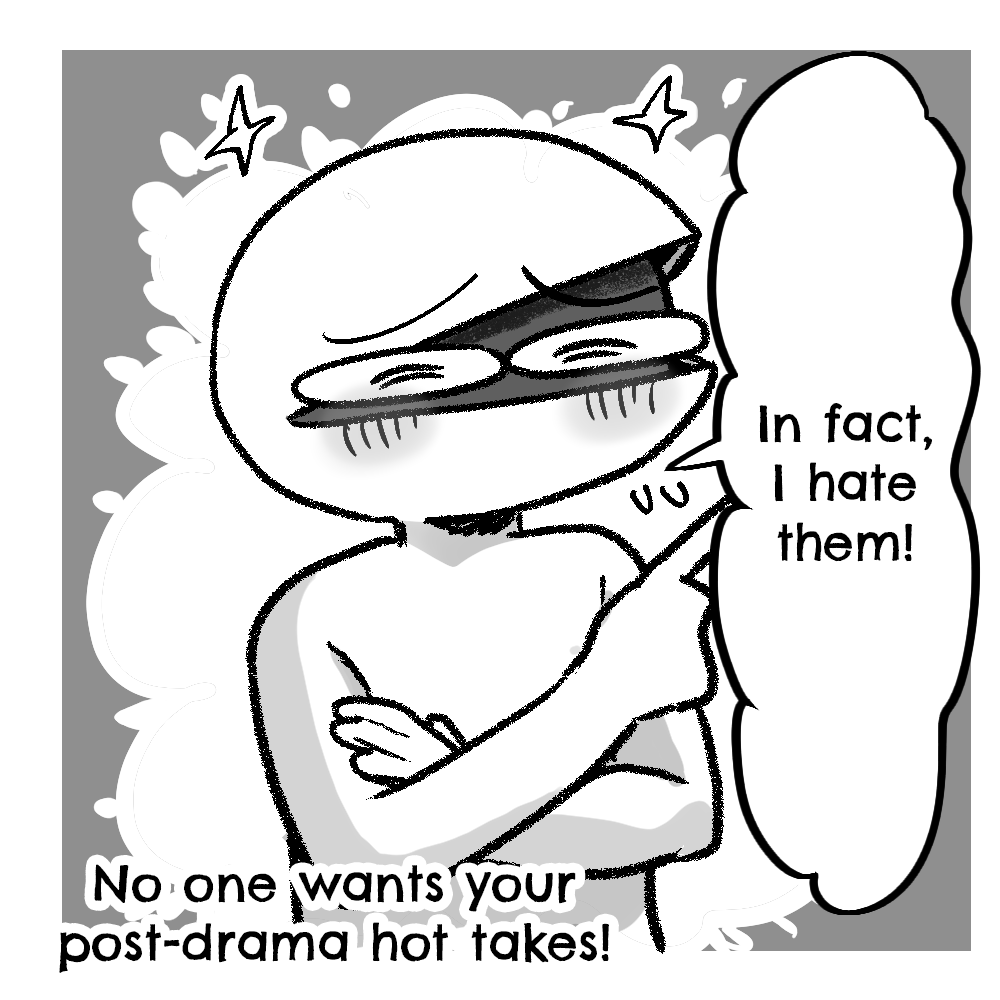"Either ignore it completely or take a few days to just lurk." On the art of letting hot takes pass you by. / Thus Spoke Hijiki Isoflavone

Article by Hijiki Isoflavone
Once seen, never forgotten
First off, to the person who submitted this topicーit’s great that you’ve already figured out one essential truth: it's best not to get involved in online controversies.
The moment you write something in a public space, those words are seen by others and lodged into their memories. Meaning, it's easy for anyone to become remembered by others as that person who said that one thing during that one drama.
Even if your thoughts change over time, people will only remember what you said back then. Knowing that, it feels like the smart move is to not have said anything in the first place.
I’ve had my fair share of moments where I've been called out, like, "Hey, Hijiki, didn’t you say that one thing back then?!" Being an old-school otaku, I’ve been using the same account for years as a badge of pride (though, honestly, it’s fine to just use different accounts for different purposes). Unfortunately, by using the same account all this time, it means there’s a long, well-documented history out there of everything I’ve ever said. Some people clear out their old posts for risk management, but I tend to think, "Well, I really did feel that way at the time, so the current me will take responsibility for it."
That said, when someone pulls up something I said ten years ago, the embarrassment definitely stings.
Either ignore it or just lurk for a few days
Why do people feel the urge to comment on controversial topics? It’s probably because these issues often involve extreme opinions that are easy to react to, criticize, or chime in on. Stop me if any of this sounds familiar: I can’t believe you said that! This is so wrong! I totally disagree with that!
When a hot topic comes up, it triggers the urge to express what you think is "right" or how things "should be." Especially when public opinion is clearly negative, it’s easy to ride that bandwagon and join in by saying, "I agree, this is bad!"
For example, let’s say a certain opinion about a specific type of work goes viral, like, "I don’t want to read X type of work—everyone finds it so annoying!"
Now, if you’re also a creator of X type works, you might get angry and think, "What’s wrong with X? I write that stuff too!" Or if you're a fan of reading those works, you might feel like rebutting, "It’s not annoying at all! Don’t pay attention to those suckers!" I'm sure that you've seen these kinds of reactions during your time on these hallowed internets, right?
However, now that I've been on the internet for so long, when I see those words pop up, I usually just think, "Oh no, not this argument again..."
Insults, crime, extreme opinions, problematic statements—these things tend to come up again and again. The longer you spend online, the more you start thinking, "Wait, haven’t I seen this before? Didn’t we talk about this already?"
It’s a bit like how time flies as you get older. Maybe it’s related somehow.
With enough experience, you start to realize, "Oh, this again. Maybe I don’t need to say anything this time." That gives you the leeway to finally break free from the endless cycle of internet debates.
Now, you might be wondering, "Do I need years of being neck-deep in the internet to get good at ignoring stuff?" Not exactly. That’s where the modern version of the classic advice, "lurk for six months," comes in. These days, lurking for just a few days can help you get a sense of how things will play out.
Most controversies cool off after a few days—companies release statements, different viewpoints start coming out, and the situation becomes clearer.
Sure, watching things unfold for a few days might make you feel like a bit of an old flame-war watcher, but if you wait and don’t jump in right away, you might find that after a while, you don’t even care enough to get involved. And by then, you’ve moved on!
If you do get involved, be careful how you do it
Even so, I don’t believe you should never talk about controversial topics online.
If you’re aiming to have a peaceful experience on the internet, then yes, it’s best to steer clear. Like I mentioned earlier, most of these topics just repeat themselves, and we've seen them all before.
Still, if you feel the need to comment or if something makes you really angry, it probably means the issue is one that’s important to youーsomething you can't just ignore.
Of course, it’s exactly because people are watching that you have to be careful how you engage with certain topics. For example, don’t go saying things like, "I saw X and Y, and if it’s true, that’s awful!" without checking your facts first. Also, don’t turn anger into a hobby, going out of your way to find or provoke others who are angry like you. And, rather than avoiding all controversial topics entirely, it might be better to focus on how you behave when you do get involved. In the end, being cautious might lead you to choose to ignore them anyway.
I’ll admit, part of me does envy those calm, stylish otaku accounts that only post their work, reviews, or analysis without getting caught up in the drama. But at the same time, I want to allow myself to have an account complete with some ego, desires, and even anger. That's my hot take, at least...


- Hijiki Isoflavone
- Mangaka. Their series Phantom of the Idol is currently being serialized in Monthly Comic Zero Sum.
